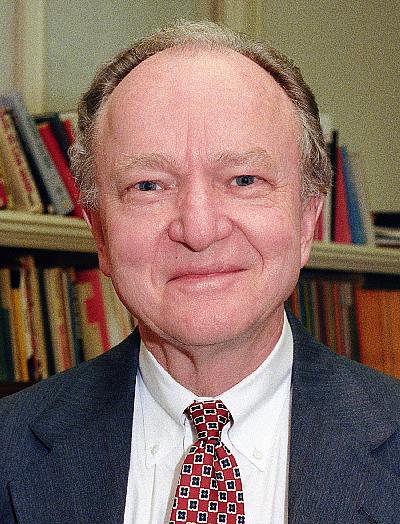November 10, 2004
Focus is Russia as UW inaugurates Ellison Center
With Americans’ attention riveted to the Middle East, interest has drifted away from the country with the most land, natural gas and nuclear warheads on Earth – Russia.
Countering that drift, more than 50 prominent scholars, diplomats and business leaders will gather next week to inaugurate the Jackson School’s new Herbert J. Ellison Center for Russian, East European and Central Asian Studies.
Named after the noted Russia scholar and UW professor emeritus, the Ellison Center will use its $3 million endowment to pump new activity into an area of study already considered a UW strength.
“We have a glorious tradition in this field,” said Jackson School director Anand Yang. “This expansion should enable us to compete with the big boys.”
The UW made its name in Russian studies in the Cold War era, Yang said, and earned prominence more recently for its deep integration of the study of Russia with that of Central Asia.
The new endowment, built with donations from members of Ellison’s extended family along with dozens of other contributors, means permanent annual revenue for center operations, fellowships, outreach activities and a distinguished professorship.
Those private funds will supplement the renewable State Department grants on which the Russian, East European and Central Asian Studies (REECAS) program has long depended (but which come with certain limitations, such as not allowing fellowships to foreign nationals).
The renamed Herbert J. Ellison Center for Russian, East European and Central Asian Studies – likely to be simply called “the Ellison Center” – will be able to attract more top scholars to the University, Yang said.
Ellison, who still lectures at the Jackson School since retiring from full-time faculty status two years ago, said the contacts he and other U.S. academics forged with Soviet counterparts made a tangible difference in shaping the post-communist transition.
The need for engagement is no less great now, he said, with U.S.-Russia relations at a crossroads and Central Asia representing a major front in the war on terrorism.
“I think this is a very important turning point in the field,” Ellison said.
The Ellison Center should be at the forefront in setting this new direction, said Stephen Hanson, the center’s director and a professor of political science. And the time is ripe.
“We have not had a serious discussion of the state of the field since the collapse of the Soviet Union, and particularly since 9/11,” Hanson said.
To that end, the center’s inaugural event will be a three-day symposium Nov. 18-20 aimed at nothing less than reshaping Russian studies.
Funded by the Henry M. Jackson Foundation and co-sponsored by the Kennan Institute of the Woodrow Wilson Center in Washington, D.C., the “Russian Studies Symposium: Opening Doors in the Decade Ahead” will feature a day of intense discussions among invited panelists, followed by public sessions Nov. 19 and 20.
In addition to diplomats like Jack Matlock, former U.S. ambassador to the Soviet Union, the symposium will bring to campus top Russia scholars from Harvard, Georgetown, Stanford, Brookings and other institutions, leaders of nonprofit organizations concerned with Russia and Eurasia, and strategists from trade-dependent corporations such as Microsoft.
Hanson and symposium co-chair Blair Ruble of the Kennan Institute plan to issue a report and brief the State Department on the symposium’s findings.
“The ideas coming out of this symposium,” Ellison said, “are going to be very important.”
Preceeding all this will be a Nov. 17 Kane Hall talk by Matlock, America’s ambassador during the last years of the Soviet Union. His visit is the final lecture in a series sponsored by the Foundation for Russian American Economic Cooperation (FRAEC), a Seattle-based nonprofit with a special focus on building bridges between the Russian Far East and U.S. West Coast.
“Russian Studies Symposium: Opening Doors in the Decade Ahead.” Highlights:
Wednesday, Nov. 17 (Kane 110)
- 7 p.m. – Jack Matlock, former U.S. ambassador to the Soviet Union.
Friday, Nov. 19 (HUB 108):
- 9:15 a.m. – George Russell, chairman emeritus, Russell Investment Group; George Kolt, a retired Russia expert with the National Intelligence Council; James Collins, former ambassador to Russia.
- 11 a.m. – Angela Stent, Georgetown University Russia expert.
Saturday, Nov. 20 (HUB 310)
- 8:30-10:30 a.m. – Discussion on U.S.-Russia relations with Herbert Ellison, Andrei Kortunov, Robert Huber and Pamela Spratlen.
- 11 a.m. – Concluding comments from Blair Ruble of the Kennan Institute and Stephen Hanson of UW.
More information: http://depts.washington.edu/reecas/events/RussStudiesSymp.htm



